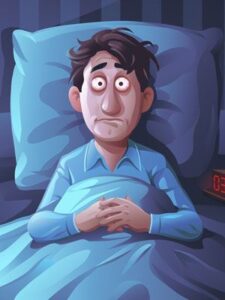In today’s fast-paced world, sleep often becomes a casualty of our busy lives. Yet, sleep is one of the most essential pillars of good health — as important as eating well and exercising. If you find yourself tossing and turning at night, you’re not alone. Millions of people worldwide struggle with sleep issues. The good news? Solutions are within reach.
Common Sleeping Issues
-
Insomnia: Difficulty falling asleep or staying asleep.
-
Sleep Apnea: Interrupted breathing during sleep, often causing frequent awakenings.
-
Restless Legs Syndrome: An uncontrollable urge to move the legs, often interfering with sleep.
-
Circadian Rhythm Disorders: A mismatch between your internal clock and the external environment, often caused by shift work or jet lag.
-
Stress and Anxiety: Mental health struggles can keep the mind racing long after the body needs rest.
Causes Behind Sleep Disruptions
-
High stress levels
-
Excessive screen time before bed
-
Poor sleep environment (too noisy, too bright, uncomfortable mattress)
-
Caffeine or heavy meals close to bedtime
-
Medical conditions (like depression, chronic pain, or thyroid issues)
Understanding the root cause is the first step toward healing.
Natural Cures for Better Sleep
1. Create a Sleep Ritual
Set a calming bedtime routine — dim the lights, sip herbal tea, read a book, or do gentle stretches. This signals to your body that it’s time to wind down.
2. Limit Screen Time
Blue light from phones, tablets, and TVs can interfere with your natural sleep hormone, melatonin. Try to avoid screens at least one hour before bed.
3. Optimize Your Sleep Environment
Keep your bedroom cool, dark, and quiet. Invest in blackout curtains, white noise machines, or aromatherapy diffusers with lavender oil.
4. Mindfulness and Meditation
Practices like meditation, deep breathing, and progressive muscle relaxation can help quiet a racing mind and promote deep sleep.
5. Watch What You Eat and Drink
Avoid caffeine, heavy meals, and alcohol close to bedtime. Opt for a light snack like a banana or a handful of almonds if you’re hungry before sleep.
6. Stay Active (But Not Too Late)
Regular physical activity can help you fall asleep faster and enjoy deeper sleep. Just make sure your workout isn’t too close to bedtime.
7. Seek Professional Help
If sleep problems persist, consider consulting a sleep specialist. Conditions like sleep apnea or chronic insomnia often need medical evaluation and treatment.
Final Thoughts
Sleep is not a luxury — it’s a necessity. By making small yet powerful changes in your lifestyle and environment, you can reclaim restful nights and energized days. Remember, better sleep equals a better life.

Nice writeup
Thankyou very much